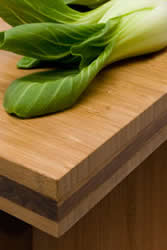
Figure 1 - Bamboo countertop
Bamboo countertops are becoming very popular in kitchens. There are a few reasons why bamboo countertops have gained a foothold into the countertop market.
- Bamboo is an extremely hard material - 25% harder than red oak and 15% harder than maple.
- Although all lumber is a renewable material, trees such as oak and maple take many years to grow from a seedling to a mature tree that can be harvested. Bamboo matures to an economical harvest growth in approximately 5 to 6 years.
- Bamboo is generally less expensive than red oak (the most common oak used for countertops) and maple.
Note: Although most home improvement centers and kitchen remodelers discuss bamboo as if it is a hardwood, bamboo is not actually a wood, it is a grass.
Bamboo butcher block countertops are available in an assortment of colors and grains:
Bamboo countertops can be made using an end grain, butcher block form of construction as shown in Figures 2 & 3.

Figure 2 - Natural bamboo butcher block countertop

Figure 3 - Caramelized bamboo butcher block countertop
Bamboo countertops can also be made using the face grain, strips of bamboo glued together to form a solid surface, as shown in Figures 4, 5, 6, & 7

Figure 4 - Vertical grain natural bamboo countertop

Figure 5 - Vertical grain caramelized bamboo countertop

Figure 6 - Vertical grain wheat bamboo countertop

Figure 7 - Vertical grain chestnut bamboo countertop
Quality bamboo countertops are made using a strand core of bamboo, as shown in Figure 8. The strand core provides added strength and stability to protect against having the bamboo countertop twist and bow. The strand core also reduces the cost of the countertop.

Figure 8 - Bamboo countertop construction
As with most wood countertops, bamboo countertops are relatively thick when compared to other types of countertop materials. Bamboo countertops range in thickness from 1 1/2 to 4 inches. This can create a problem as the countertop height relative to the floor is higher than other countertop materials. In some cases homeowners may find this additional height cumbersome when trying to perform cooking tasks.
Bamboo countertops should have mineral oil or beeswax applied to the surface once a month during the first year of installation and once a year after that, depending on the homeowners usage of the bamboo countertop.
If you are considering installing either end grain (butcher block) or face grain bamboo countertops in your kitchen you should look for a manufacturer who provides the following:
- The bamboo countertops are made using food-safe, formaldehyde free adhesives.
- The bamboo countertops should be finished using food safe mineral oil or beeswax.
- Qualifies as a LEED® v3 credit
- Qualifies as a rapidly renewable material – MR 6
- Qualifies as a low-emitting material – IEQ 4,4
